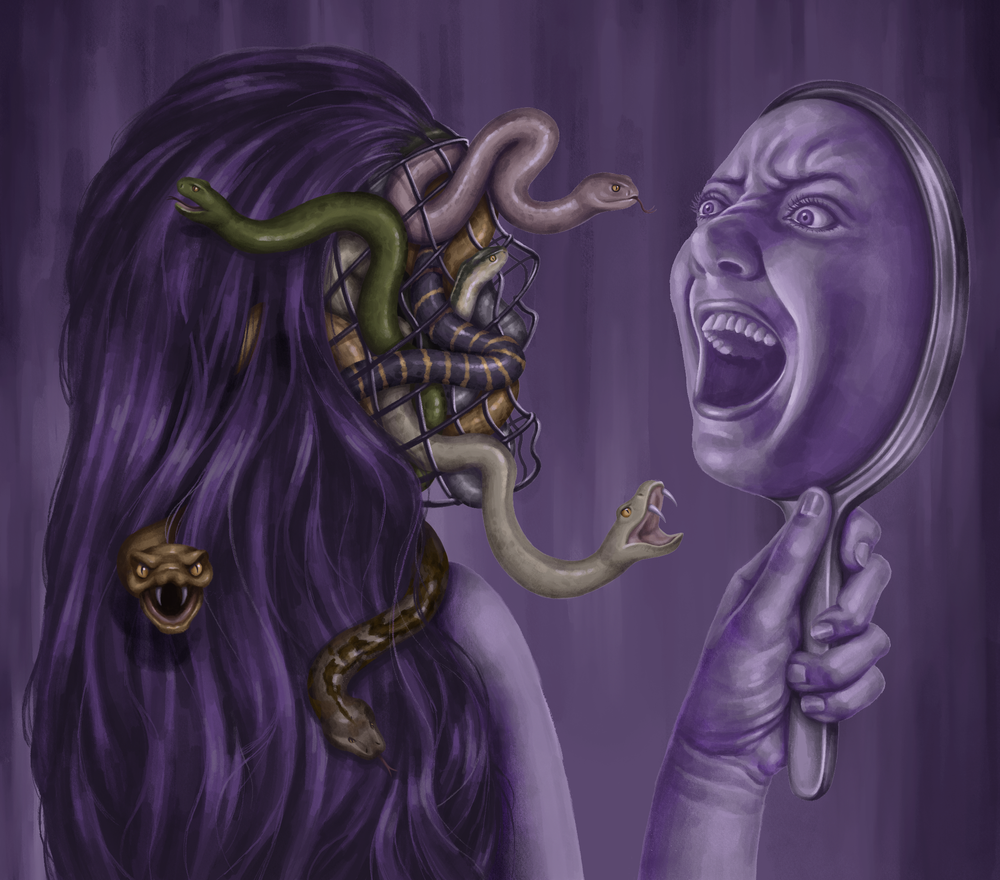ISSN: 1941-4137
POETRY THAT ENACTS THE ARTISTIC AND CREATIVE PURITY OF GLASS
POETRY THAT ENACTS THE ARTISTIC AND CREATIVE PURITY OF GLASS

Alex Carrigan (he/him; @carriganak) is a bisexual editor, poet, and critic from Virginia. He has had fiction, poetry, and literary reviews published in Quail Bell Magazine, Lambda Literary Review, Empty Mirror, Gertrude Press, Quarterly West, Roi Fainéant, Stories About Penises (Guts Publishing, 2019), Closet Cases: Queers on What We Wear (Et Alia Press, 2020), and more. He is also the co-editor of Please Welcome to the Stage…: A Drag Literary Anthology with House of Lobsters Literary. For more, visit his website.
April 17, 2022
Edited by Stephanie Kaylor
Edited by Stephanie Kaylor
Review of Head of a Gorgon by Raegen Pietrucha
 Head of a Gorgon
by Raegen Pietrucha
Vegetarian Alcoholic Press, 2022
Medusa is probably one of the most tragic figures in Greek mythology. A victim of sexual abuse, she’s cursed into the gorgon form, turns anyone she gazes at into stone, and exists solely to be killed by Perseus and for her body to be desecrated so he can save his lover from the kraken. She’s at multiple points a victim, a monster, a tool, and a force of nature, so to understand her truly means to explore her and her circumstances beyond the Perseus myth.
In her forthcoming poetry collection from Vegetarian Alcoholic Press, poet Raegen Pietrucha examines the Medusa character more broadly than in past works of literature in Head of a Gorgon. The collection looks at Medusa in a modern, feminist context, both directly and indirectly, to understand what circumstances can turn a woman into a gorgon and what power or lack of power comes from this circumstance.
The first poem in the collection is the death of Medusa, written as the gorgon is decapitated. Pietrucha writes “The Gorgon’s Parting Thoughts” in a long, run-on sentence, as if Medusa’s thoughts are trying to process her death as her head separates from her body. Lines such as “…open neck rejects / my head and heads for which home / is unknown…” and “…wondering why others who / tried to reach me froze but he / could never have been my stone” are some of examples within this poem that make Medusa’s death both a moment of triumph for her killer, but also one of internal confusion and a sudden realization of the end.
Pietrucha then shifts the collection to a modern setting, with the next section, entitled “Origins” following the early life of a young woman as she deals with her developing sexuality and troubled home life. These pieces tend to focus on the observations of a young woman’s life, such as her attention to the changing seasons and how they correlate to the change in her life in “The Spring Before Leaving Father” and the exploration of one’s body through those around them in “Cheer” or when left alone with one’s self in “Seeing Stars.”
The following sections contain longer, multipart poems that explore the relationships between the Medusa figure and her body and with those around her. “M and P’s Exchange” reads as a poetic discussion between the figures of the myth, while “Transfiguration” is an examination of the gorgon body in short pieces about aspects like the snake skin or the forked tongue. The longest piece in the collection, “Reinvention Sequence,” merges these short poems with more experimental forms such as the “Shedding Skin” erasure pieces and italicized sections. Each of these sections attempts to draw the gorgon form as a metaphor and as a more realized creation of flesh and blood than the myth ever afforded Medusa, and by playing with these details, Pietrucha asks the reader to consider how the gorgon can be viewed nowadays.
In between most of these longer pieces are poems that continue the journey from Medusa’s island to the battle between Perseus and the kraken. Rather than center the hero’s journey, they explore what Medusa’s thinking now that she’s been severed from her form and trapped in a bag. These sections play a lot with sailing and sea imagery, a recurring element in both Pietrucha’s collection and Greek mythology as a force that gives life but also restricts life. In the numerous “Your Captain Speaking” pieces in the collection, lines such as “The water forged you; now your head’s / in a sack — no sign of light. / Is your life a blessing or curse, you ask? / Who retains the right to name?” and “This water was never hesitating, just building / and building — then, unzipping, snickering / at you, the prey it ached to drown in its dark” show how the central figure is at the mercy of man and nature, and later pieces, such as “Mumfish” reach a peak when they ask for why women like Medusa are often left to be taken by forces beyond their control, writing “I nearly drowned under the weight of his water, / unarmed, unable to swim from the slaughter. / Sometimes I wonder if you would’ve missed me at all. / Mother, I’ll never know why you didn’t protect your daughter. / I’m still searching for a way through the weight of that water.”
Head of a Gorgon is Pietrucha’s attempt to break past the stone walls of the Medusa character and look at how her character can be explored in modern times. It’s an experimental collection that is at times devastating but eye-opening. It may be hard to confront the realities of abuse and isolation, but the collection asks the reader to consider what is needed to ensure one doesn’t remain alone due to the cruelties of those around them.
Visit Raegen Pietrucha's Website
Visit Vegetarian Alcoholic Press' Website
Head of a Gorgon
by Raegen Pietrucha
Vegetarian Alcoholic Press, 2022
Medusa is probably one of the most tragic figures in Greek mythology. A victim of sexual abuse, she’s cursed into the gorgon form, turns anyone she gazes at into stone, and exists solely to be killed by Perseus and for her body to be desecrated so he can save his lover from the kraken. She’s at multiple points a victim, a monster, a tool, and a force of nature, so to understand her truly means to explore her and her circumstances beyond the Perseus myth.
In her forthcoming poetry collection from Vegetarian Alcoholic Press, poet Raegen Pietrucha examines the Medusa character more broadly than in past works of literature in Head of a Gorgon. The collection looks at Medusa in a modern, feminist context, both directly and indirectly, to understand what circumstances can turn a woman into a gorgon and what power or lack of power comes from this circumstance.
The first poem in the collection is the death of Medusa, written as the gorgon is decapitated. Pietrucha writes “The Gorgon’s Parting Thoughts” in a long, run-on sentence, as if Medusa’s thoughts are trying to process her death as her head separates from her body. Lines such as “…open neck rejects / my head and heads for which home / is unknown…” and “…wondering why others who / tried to reach me froze but he / could never have been my stone” are some of examples within this poem that make Medusa’s death both a moment of triumph for her killer, but also one of internal confusion and a sudden realization of the end.
Pietrucha then shifts the collection to a modern setting, with the next section, entitled “Origins” following the early life of a young woman as she deals with her developing sexuality and troubled home life. These pieces tend to focus on the observations of a young woman’s life, such as her attention to the changing seasons and how they correlate to the change in her life in “The Spring Before Leaving Father” and the exploration of one’s body through those around them in “Cheer” or when left alone with one’s self in “Seeing Stars.”
The following sections contain longer, multipart poems that explore the relationships between the Medusa figure and her body and with those around her. “M and P’s Exchange” reads as a poetic discussion between the figures of the myth, while “Transfiguration” is an examination of the gorgon body in short pieces about aspects like the snake skin or the forked tongue. The longest piece in the collection, “Reinvention Sequence,” merges these short poems with more experimental forms such as the “Shedding Skin” erasure pieces and italicized sections. Each of these sections attempts to draw the gorgon form as a metaphor and as a more realized creation of flesh and blood than the myth ever afforded Medusa, and by playing with these details, Pietrucha asks the reader to consider how the gorgon can be viewed nowadays.
In between most of these longer pieces are poems that continue the journey from Medusa’s island to the battle between Perseus and the kraken. Rather than center the hero’s journey, they explore what Medusa’s thinking now that she’s been severed from her form and trapped in a bag. These sections play a lot with sailing and sea imagery, a recurring element in both Pietrucha’s collection and Greek mythology as a force that gives life but also restricts life. In the numerous “Your Captain Speaking” pieces in the collection, lines such as “The water forged you; now your head’s / in a sack — no sign of light. / Is your life a blessing or curse, you ask? / Who retains the right to name?” and “This water was never hesitating, just building / and building — then, unzipping, snickering / at you, the prey it ached to drown in its dark” show how the central figure is at the mercy of man and nature, and later pieces, such as “Mumfish” reach a peak when they ask for why women like Medusa are often left to be taken by forces beyond their control, writing “I nearly drowned under the weight of his water, / unarmed, unable to swim from the slaughter. / Sometimes I wonder if you would’ve missed me at all. / Mother, I’ll never know why you didn’t protect your daughter. / I’m still searching for a way through the weight of that water.”
Head of a Gorgon is Pietrucha’s attempt to break past the stone walls of the Medusa character and look at how her character can be explored in modern times. It’s an experimental collection that is at times devastating but eye-opening. It may be hard to confront the realities of abuse and isolation, but the collection asks the reader to consider what is needed to ensure one doesn’t remain alone due to the cruelties of those around them.
Visit Raegen Pietrucha's Website
Visit Vegetarian Alcoholic Press' Website
Glass: A Journal of Poetry is published monthly by Glass Poetry Press.
All contents © the author.
All contents © the author.



